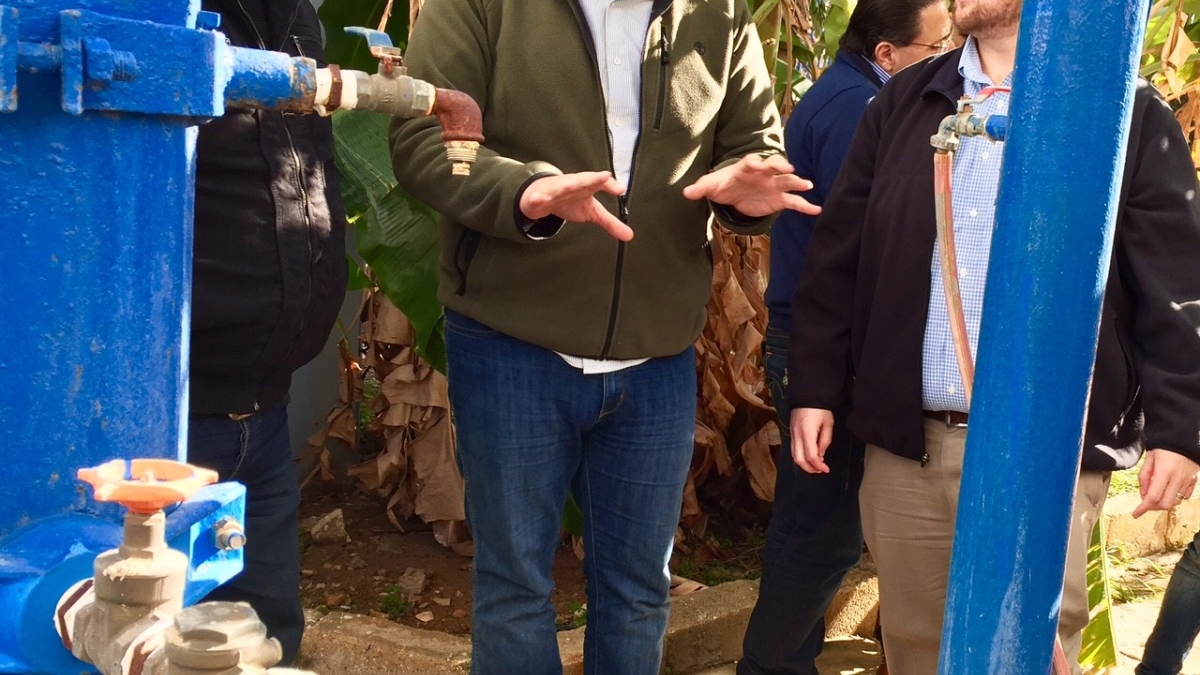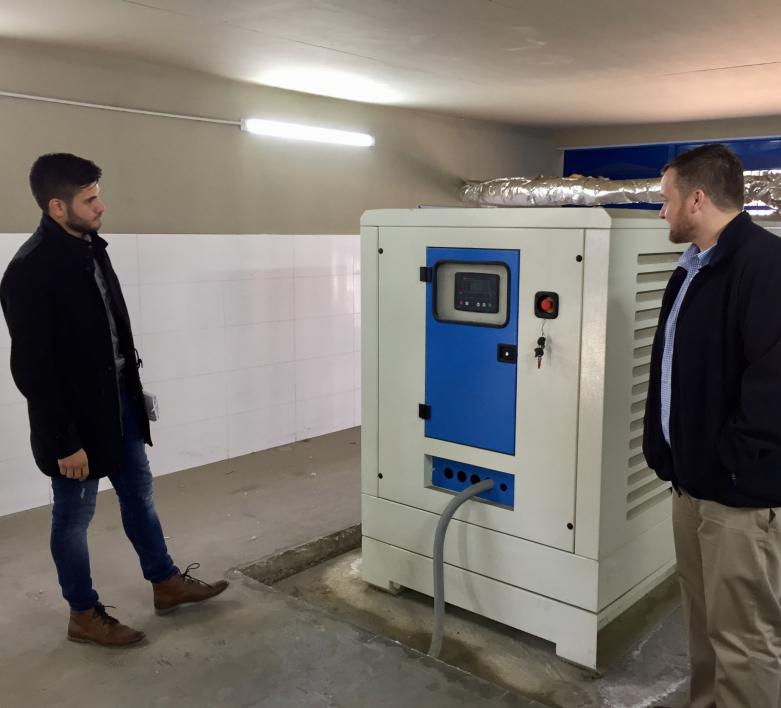ASU and partners to bring clean water to Middle East communities

Anthonio Moawad (center), project manager at the René Moawad Foundation, and ASU professor Rhett Larson (right) discuss the water-quality details of a well under consideration in Qubbe, Lebanon, with a local utility expert (left). This site is being considered as the first for implementation and would provide purified water to people in Bab El Tebbeneh, one of the poorest communities in Lebanon. Photo by Ashley St. Thomas/ASU Walton Sustainability Solutions Initiatives
An Arizona State University-led global consortium of technology and in-country partners will implement a two-year, $1.95 million USAID project to develop and test affordable, portable clean water solutions in the Middle East.
Communities across the Middle East are facing severe water shortages. Some communities rely on limited and variable water supplies without the infrastructure to adequately treat and transport the water. Energy sources needed to purify water can be inaccessible, expensive, or unreliable.
Population needs and challenges associated with the growing influx of refugees from neighboring countries, such as Syria, have exacerbated the problem, frequently making water a source of dispute between communities. In some instances, the relationship between local customs and constitutional governance, including different interpretations of the laws that govern water rights and water pricing, affect how water resources are developed and managed.
The USAID project, "A Holistic Water Solution for Underserved and Refugee Host Communities in Lebanon and Jordan," will be implemented in 18 communities throughout Jordan and Lebanon, benefitting more than 36,000 people. The scalable model will be established in accordance with community-specific legal and cultural frameworks.
An interdisciplinary team from ASU, ranked by US News as the No. 1 school in the nation for innovation, is spearheading this project by providing expertise in sustainability, law and engineering. The team comprises Richard Rushforth, a project manager for the Walton Sustainability Solutions Initiatives; Rhett Larson, a professor with the Sandra Day O’Connor College of Law and an expert in Middle East water policy; and Nathan Johnson, an assistant professor at the ASU Polytechnic School, one of the six Ira A. Fulton Schools of Engineering. They are joined in the consortium by public and private partners from across the globe focused on water security and development: H2O for Humanity (Illinois), GreenCo Water (Australia), Mercy Corps (a global development organization), the René Moawad Foundation (Lebanon), and Zero Mass Water (Arizona).
“Having strong implementation partners is integral to the success of this project,” Rushforth said. “USAID demonstrated solutions-oriented global leadership with its new co-creation project development model, which allowed us to build relationships with world-class partners, providing greater, more immediate impact to communities and people in need throughout Lebanon and Jordan.”
The consortium took shape through preliminary meetings led by ASU. Larson was familiar with H2O for Humanity’s success with groundwater-treatment kiosks in India as well as the René Moawad Foundation’s renowned reputation serving rural populations in Lebanon. Rushforth, along with Joshua Fine, a project development associate at the René Moawad Foundation, participated in the co-creation workshop where Zero Mass Water, led by ASU’s Cody Friesen, and GreenCo Water were brought into the fold. Mercy Corps joined the consortium as its implementing partner in Jordan in February 2016.
“Water is inherently interdisciplinary. You cannot develop water without considering environmental, technical, economic, cultural and legal issues,” Larson said. “Our team is made up of experts in all areas of water policy and management, which makes this project especially exciting. We have a chance to truly help thousands of people in need.”
The consortium has developed a holistic water system that operates at the household and community levels by making use of nontraditional water resources in order to avoid further depleting the region’s scarce groundwater supply. Each system includes H2O for Humanity’s water purification kiosk (AquaSafi) to purify water through reverse osmosis that eliminates salts and contaminants. Two systems will be equipped with an enhanced power supply system.
“In order to provide clean water, we must first ensure there is reliable power,” said Johnson, whose primary goal is to design, integrate and deliver an optimized power system. “Since the kiosks are currently connected to the grid — which is unreliable for up to several hours a day — we need to provide sustainable, reliable power to run the water treatment system.”
Hasan Daouk of Zero Mass Water (left) and ASU professor Rhett Larson discuss placement of H2O for Humanity’s AquaSafi-2000 water purification system in the existing kiosk at an out-of-use well in Qubbe, Lebanon. Photo by Ashley St. Thomas/ASU Walton Sustainability Solutions Initiatives
At the household level, Zero Mass Water’s technology (SOURCE) will allow families in Lebanon and Jordan the opportunity to own their own water source for the first time. These household solar panels convert atmospheric water vapor into clean drinking water, even in the semi-arid and arid climates of the Middle East. Combining these two technologies with GreenCo Water’s Pak-Flat Tank — a 1,000-liter tank that ships flat-packed in a box and can be assembled in less than 10 minutes — will increase available potable water in the selected communities by 20 percent.
The René Moawad Foundation and Mercy Corps — the project’s implementing partners in Lebanon and Jordan, respectively — will conduct trainings for women (in collaboration with women’s cooperatives in the selected communities) to manage the water kiosks and generate income. The implementing partners will also conduct awareness-raising campaigns on water-demand management. The holistic water systems will be operational in Lebanon and Jordan in the spring of 2017.
More Law, journalism and politics
Can elections results be counted quickly yet reliably?
Election results that are released as quickly as the public demands but are reliable enough to earn wide acceptance may not…
Spring break trip to Hawaiʻi provides insight into Indigenous law
A group of Arizona State University law students spent a week in Hawaiʻi for spring break. And while they did take in some of the…

LA journalists and officials gather to connect and salute fire coverage
Recognition of Los Angeles-area media coverage of the region’s January wildfires was the primary message as hundreds gathered at…


